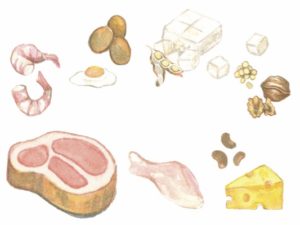
Protein is found in many foods. Both animal and plant proteins are made up of about 20 amino acids. Each protein contains varying proportions of each, but all food proteins contain some amount of each amino acid. Amino acids are used to build the protein structures of your cells and are required for many other body functions, such as muscle building and immune system regulation.
Nine of the amino acids are considered essential, meaning they are not made by your body and must be obtained through your diet. The other eleven amino acids are considered nonessential as they can be made by your body. There are several nonessential amino acids that are classified as conditionally essential, meaning they become essential under specific conditions (e.g., stress or illness).
To ensure you get adequate amounts of the essential amino acids, as well as other nutrients that support body function, it’s important to eat a variety of protein sources. To promote health and longevity, reach for protein sources lower in saturated fats (linked to an increased risk of heart disease). This means eating more plant proteins and fewer animal proteins. Plant proteins are not only lower in saturated fats but also contain fiber and phytochemicals, two categories of nutrients that are vitally important to your health and well-being. Below is a list of plant protein sources.
- Legumes like beans, peas, and lentils are a good low-fat source of protein and fiber. They are also packed with vitamins and minerals such as folate, iron, potassium, and magnesium.
- Tofu, tempeh, and edamame are all soy-based plant proteins and are rich in folate, vitamin K, and fiber. Tempeh comes from fermented soybeans so it also contains probiotics and increased amounts of B vitamins.
- Seitan is made from wheat gluten and is one of the richest sources of plant proteins, containing 25 grams in a 3.5 oz serving.
- Nuts and seeds contain healthy fats and are good sources of vitamins, minerals, and phytonutrients.
- Whole grains like quinoa, spelt, and amaranth contain 8-10 grams of protein per cooked cup and are also a good source of many different vitamins, minerals, and phytonutrients.
- Nutritional yeast contains 8 grams of protein and 4 grams of fiber in 2 tablespoons. Fortified nutritional yeast is also a good source of B vitamins, especially vitamin B12.
